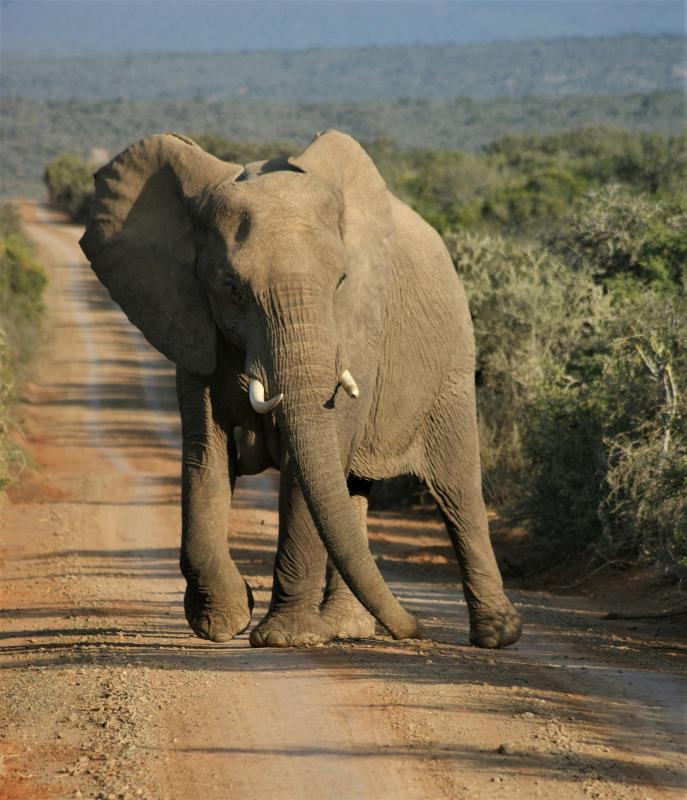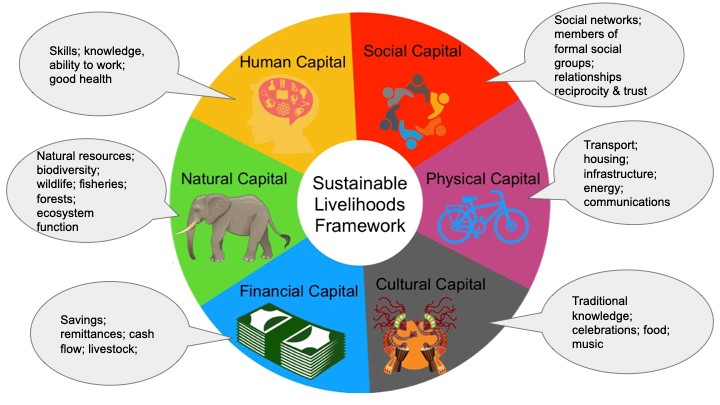
Natural capital as a potential tool for resolving human-wildlife conflict
When a poor rural family loses a loved one, the emotional trauma is matched by the economic adversity emanating from the loss of a husband, wife, son, or daughter who made an important contribution to the material well-being of the family. Recently, there have been incidents in Malawi where wildlife in African conservation landscapes has caused not only crop or livestock losses to rural families but also the death of a family member (Matzen, 2024). It’s unacceptable. It is a failure of management and if these incidents continue without a substantive solution, it may not be long before rural people have had enough of conservation. Compensating the family is not good enough. The death of a person needs an appropriate response. Let’s explore what that could be.
For most of the time humans have been on Earth, they have been poor. It’s really only after World War II that widespread economic growth lifted large numbers of people into the middle class where food and the basic goods of life were not always in short supply. Of course, the Industrial Revolution started it all, but wealth was still concentrated in relatively few hands until the post-war era. How did people survive? Being poor doesn’t mean you have nothing. Mostly, especially in rural Africa, it means you are never far away from a crisis. The smallest incident can tip you into economic disaster. Adverse weather, sickness, a broken bicycle chain, a harsh prison sentence for a minor crime, an accident on the bus, or a wild animal eating all your crops can make the difference between being poor and being desperate. There are no insurance policies for poor rural people.
Poor people respond by building a complex web of insurance-like backup plans that they can draw on when a crisis arrives. We can think of these as forms of capital (Figure 1) in a series of different bank accounts, each of which you can draw on when needed (Natarajan et al, 2004). There is natural capital. Forest foods, medicine, and bushmeat can be used to get through a hungry time. There is social capital. A network of friends and relatives who can lend you money, labour, or other support when you run into trouble. There is human capital. A good education, good health, and special skills that can help your family survive. A daughter may be sent to work in the city as a teacher, sending money home for a while until the crisis is over. There is financial capital. The money in a box under the bed, an outstanding loan you could call in from a friend you helped when he or she was in a crisis. There is physical capital. A bicycle, a mobile phone, and some other livestock such as goats and cows. All these things can help you navigate a crisis. If all the five community capital categories are well developed - the accounts are full - you will be able to survive a crisis. In Africa, we have cultural capital as well. Our rich cultures bind us together in a common cause, so we pull together as a community in times of crisis. So, if conservationists want to help rural people, we don’t have to solve the problem of rural people being poor. We just have to top up the community capital accounts where and when we can. How do we do that?

Figure 1: Livelihoods capitals
How about helping out with the natural capital account? We have been telling rural communities for 30 or 40 years in Malawi and other countries that conservation and natural ecosystems are essential for their survival. Academic research supports communities leading the way in conservation (Dawson, 2021). And yet all they see is a larder stocked with meat that they are not allowed to touch, even if their crops fail because of adverse weather, pests, or destruction from wild animals. They are thrown into a crisis through no fault of their own and the resources to get them through the crisis are unavailable. This breeds resentment. When resentment builds, it explodes in ways that are not predictable and this happens in all societies. As conservationists, we brainstorm and wring our hands and discuss human-wildlife conflict continually, never really coming up with a solution. But the solution is exactly what we do so well. We build natural capital. We can feed people in times of hunger. When I suggested this to a prominent conservationist, I was told that if we killed all the animals in the national park, it would feed the whole community for one day. But no one expects conservation to feed everyone or to solve all the problems of rural poverty. What we could do very well though, is intervene with food in a crisis. The successful management of conservation areas that result in increasing elephant populations in national parks, should be seen as an opportunity to engage with rural communities using the natural capital that forms an essential part of coping with being poor. Shooting a few elephants, at a time of year when the meat would help the poorest families, would go a long way towards fulfilling the promise of conservation. It would also integrate quite well with managing increasing elephant populations in a finite area. If we identify the families who are experiencing a crisis - the death of a breadwinner, a crop failure, or an accident that rendered an able-bodied family member incapable of contributing to the family economy until he or she has healed - we can make a big impact on how rural communities think about conservation. They would instantly understand the promise and the benefit of conserving natural ecosystems.
If the death of a family member has been caused by an elephant that we manage, the obligation to address the issue becomes enormous. It should have an economic cost to the conservation organisation that is commensurate. Currently, there is no economic incentive to solve human-wildlife conflict, despite the handwringing, publicly expressed concern, and reputation issues that occupy the minds of conservationists. Money talks, and in this case, it needs to speak louder. Host governments where public-private partnerships form the basis of their conservation strategy also need to step up on behalf of their people. Penalties for deaths caused by wildlife need to be written into the public-private partnership agreement. Fines need to be substantial and paid not to the government, but to a fund that is managed under complete control of the local community where the death occurred. I suggest the conservation organisation forfeit half its annual revenue. Let’s see how quickly the issue gets solved when this is hanging over their heads.
If conservationists address as many crises as they can in their local community, using the substantial natural capital contained in a well-managed conservation area, they will go a long way towards building a constituency for conservation. If conservationists address the deaths of people who are killed by the animals they manage in a proportionate way, it will drive the incentive to solve the problem of human-wildlife conflict and may just avoid the resentment (e.g. Tarimo & Olotu, 2020) that causes local communities to burn vehicles and try to murder the management of the national park that doesn’t seem to care. Let’s see if African conservation can meet the challenge.
References
Matzen, L. (2024) Social rumblings and bitter fruit. When animal protection costs human lives. https://medium.com/@Lou_Matzen/social-rumblings-and-bitter-fruit-3493fadbf796
Natarajan, N., Newsham, A., Rigg, J., Suhardiman,D. (2022) A sustainable livelihoods framework for the 21st century, World Development, Volume 155, 105898, https://doi.org/10.1016/j.worlddev.2022.105898.
Dawson, N. M., et al (2021) The role of Indigenous peoples and local communities in effective and equitable conservation. Ecology & Society, 26 (3):19 https://doi.org/10.5751/ES-12625-260319
Tarimo, K.V. & Olotu, M.I. (2020) Local community participation in wildlife conservation and management in Rungwa Game Reserve, Tanzania. Environmental and Socio-economic Studies, 8(2):21-31. https://doi.org/10.2478/environ-2020-0009
-

Dr Michael Musgrave
Research Associate
We support the free flow of information. Please share:
More content
-

What Foot and Mouth Disease-free means for South Africa’s game meat trade
Ms Lydia Daring Bhebe…Explore the latest developments in South African provinces achieving and maintaining Foot and Mouth Disease (FMD) free status…
Articles -

The world wildlife trade regulator is 50 – here’s what has worked and what needs to change
Daniel Challender…Most countries implement Cites, the Convention on International Trade in Endangered Species of Wild Fauna and Flora as…Articles -

Enabling Sustainable Wildlife Trade
Prof Francis VorhiesEnabling sustainable wildlife trade is a key policy measure for growing Africa's wildlife economy. In this respect, CITES…
Articles -

Has CITES become too complicated to be effective?
Prof Francis VorhiesGovernments agreed to the text of CITES in the 1970s, which is quite straightforward. However, the agreement’s implementation…
Articles -

From poachers to providers: Can Africa's wild meat market save wildlife?
Dr Wiseman NdlovuHave you ever considered how wild meat could be more than just a cultural staple but also a…
Articles -

As a fellow of the African Wildlife Economy Institute (AWEI), I am excited to attend the upcoming 3rd…
Articles -

A theory of change to improve conservation outcomes through CITES
Dr Michael 't Sas-Rolfes…Here we articulate the implied theory of change (ToC) underpinning the design and operation of CITES (Convention on...
2025Research -

Wild Meat Value Chain Integration Systems: Opportunities for Value Chain Formalisation and Scaling in Africa
Dr Wiseman Ndlovu…Establishing a legal, safe and sustainable wild meat sector promises to potentially reduce demand for illegally sourced meat...
2025Research -

AWEI's 2024 Wildlife Economy Dialogue Series
Ms Emily TaylorRediscover 2024: A year of insight and inspiration
In 2024, AWEI proudly hosted three ground-breaking dialogue series in…
Articles
Get updates by email
Through impactful research, stakeholder engagement, and professional development, AWEI is supporting the wildlife economy across Africa. Please subscribe for occasional updates on our work and forthcoming events.
Sign up for a quarterly dose of AWEI insights
In a complex and changing world, AWEI generates strategic ideas, conducts independent analysis on wildlife economies, and collaborates with global scholar-practitioners to provide training and expertise for biodiversity conservation, climate resilience, and inclusive economic opportunities in Africa.
